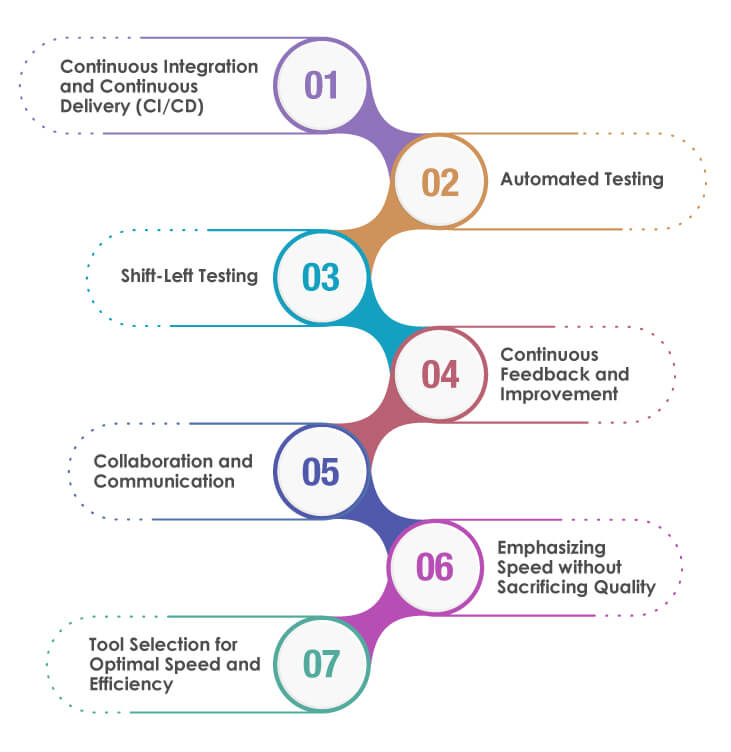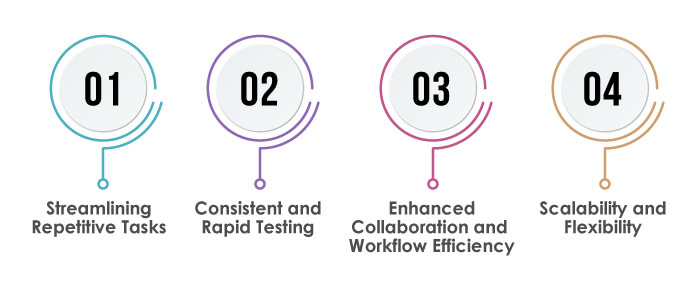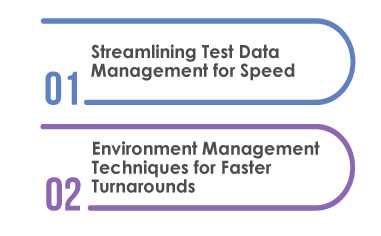Published: 16 Jan 2024
Accelerating Software Delivery with Effective DevOps Testing Process
- Key Principles of DevOps Testing for Faster Delivery?
- How Does Automation in DevOps Speed Up the Delivery Process?
- Optimizing Test Environments for Rapid Delivery
- Metrics for Speed and Efficiency in DevOps Testing
- Conclusion
- How can TestingXperts Help with DevOps Testing?
In today’s fast-paced digital marketplace, the pressure is scaling on businesses to deliver software rapidly and reliably. This has spotlighted the crucial role of DevOps testing in accelerating software delivery. DevOps, a combination of development and operations, is not only about speed. It’s about optimizing quality, enhancing feedback, and adapting to the dynamic digital era.
DevOps practices have transformed how software is developed and deployed, leading to significant enhancements in delivery speed. According to statistics, the elite DevOps teams achieve a staggering 2604 times faster failure recovery rate. This acceleration is not only about speeding processes. It involves integrating continuous integration and continuous delivery (CI/CD), automated testing, and proactive feedback mechanisms. Collectively, these elements contribute to a more efficient and effective development lifecycle, enabling businesses to respond swiftly to market changes and customer needs.
Adopting DevOps has proven beneficial for companies, evidenced by a 68% reduction in deployment failures and 2.8 times increase in the frequency of software deployments. Such statistics highlight the critical impact of effective DevOps testing strategies. Furthermore, 58% of organizations reported that implementing DevOps significantly improved software quality, while automation, a cornerstone of DevOps, is anticipated to eliminate 80% of routine IT tasks by 2025.
Key Principles of DevOps Testing for Faster Delivery

DevOps testing stands out in software development as a trigger for faster delivery. It’s a strategic shift from traditional testing methodologies, focusing on seamless integration and continuous delivery. Let’s look into the key principles that make DevOps testing an indispensable tool for faster and more efficient software delivery.
Continuous Integration and Continuous Delivery (CI/CD):
Central to DevOps, CI/CD involves frequent code integration into a shared repository, followed by automated testing and deployment. This minimizes integration issues, enabling quicker and more reliable software releases. It involves constant monitoring and testing code changes, ensuring that new integrations do not disrupt existing functionalities.
Automated Testing:
Automation in testing is crucial for speeding up development cycles without compromising quality. Automated tests are more consistent and can be run frequently, ensuring that each aspect of the software is thoroughly tested. This results in a robust, error-free product delivered in a shorter timeframe.
Shift-Left Testing:
Shifting testing to earlier stages in the development process ensures early bug detection and resolution. This proactive approach reduces the complexity and cost of fixing issues later, leading to faster overall development without compromising software integrity.
Continuous Feedback and Improvement:
DevOps testing succeeds with continuous feedback. Regular feedback from users and stakeholders is integral for the iterative improvement of the software. This ongoing feedback loop and enhancement ensures that the software evolves in alignment with user needs and market trends.
Collaboration and Communication:
Effective DevOps testing requires close collaboration and communication between developers, testers, and operations teams. Breaking down silos and promoting a culture of open communication ensures that everyone is aligned with the project goals and can work together more efficiently.
Emphasizing Speed without Sacrificing Quality:
A fundamental principle of DevOps testing is the combination of speed and quality. It involves implementing practices that enhance development speed, like automated testing and CI/CD, while maintaining rigorous quality standards. The goal is to deliver software rapidly without compromising its performance, security, or user experience.
Tool Selection for Optimal Speed and Efficiency:
The selection of testing tools in DevOps is pivotal. Tools should be chosen based on their ability to seamlessly integrate into the existing DevOps workflow, automate repetitive tasks, and provide accurate and rapid feedback. For instance, tools like Selenium for automated web testing or Jenkins for continuous integration and delivery offer functionalities that streamline processes, reduce manual effort, and enhance collaboration. The key is to select tools that align with the specific needs of the project and team, ensuring they augment rather than hinder the development process.
How Does Automation in DevOps Speed Up the Delivery Process?

Automation is a key ingredient in the DevOps process in the software development industry, significantly enhancing speed and efficiency. Automation in DevOps isn’t just a tool. It’s a fundamental approach that reshapes the entire software development and operations lifecycle.
Streamlining Repetitive Tasks:
Automation’s most significant impact in DevOps is taking over repetitive, time-consuming manual tasks. From automating code compilations to running standardized unit tests and handling deployments and server configurations, automation dramatically reduces the manual workload. This reduction in manual effort speeds up these tasks significantly and enhances consistency and reliability across the development cycle. By freeing up valuable time for developers, testers, and operations teams, they can focus on more critical aspects of product development, such as feature innovation and problem-solving.
Consistent and Rapid Testing:
Automated testing is another crucial area where speed meets quality. Tools like Selenium, JUnit or NUnit can run a suite of tests automatically whenever a new code is committed. This ensures that any new changes are vetted for issues immediately, significantly reducing the likelihood of bugs making it to the later stages of development. This approach accelerates the testing process and maintains a high-quality standard, as automated tests are less prone to human error and can be more exhaustive than manual testing.
Enhanced Collaboration and Workflow Efficiency:
Beyond the technical aspects, automation tools are vital in enhancing collaboration within DevOps teams. Tools such as Jenkins or Bamboo provide a centralized platform where all team members can see real-time updates, share feedback, and synchronize their workflows. This level of transparency and collaboration eliminates silos between developers and operations, ensuring that everyone is aligned and can work more efficiently together.
Scalability and Flexibility:
Automation also brings scalability and flexibility to the forefront of DevOps. With the ability to handle various environments and configurations effortlessly, automation tools like Docker and Kubernetes allow teams to scale up services to meet increased demands or deploy updates across multiple servers efficiently. This adaptability is key in today’s fast-paced market, where responsiveness to change and user demands is crucial for success.
Optimizing Test Environments for Rapid Delivery

Optimizing test environments is beneficial and essential in DevOps, emphasizing continuous integration, continuous deployment, and agile responses to change. This optimization directly supports DevOps’s rapid, efficient, and high-quality software delivery approach.
Streamlining Test Data Management for Speed:
In a DevOps context, efficient test data management is crucial to maintaining the momentum of continuous integration and testing. DevOps teams can ensure the data is always current, relevant, and reflective of real-world scenarios by automating test data creation, management, and deployment. This is vital for accurate testing and keeping pace with DevOps’s frequent code changes and updates. Moreover, techniques like data masking protect sensitive information while testing, aligning with the security concerns inherent in the DevOps approach.
Environment Management Techniques for Faster Turnarounds:
DevOps thrives on rapidly developing, testing, and deploying software. Effective environment management, facilitated by tools such as Docker for containerization and Infrastructure as Code (IaC) platforms, streamlines this process. These technologies enable teams to quickly set up, replicate, and dismantle test environments, ensuring they are consistently aligned with the latest application requirements. This capacity for rapid and flexible environment management is critical in a DevOps setting, where delays in setting up or configuring environments can significantly interfere with continuous development and deployment flow.
Metrics for Speed and Efficiency in DevOps Testing

In DevOps, where speed and efficiency are essential, metrics are crucial in evaluating and enhancing these aspects. Properly defined metrics provide tangible data that guide decisions and improvements in the DevOps process.
Key Performance Indicators (KPIs) for Speed and Efficiency:
Identifying the right KPIs is essential in measuring the effectiveness of DevOps testing. KPIs like deployment frequency, change lead time, change failure rate, and mean time to recover (MTTR) offer insights into the speed and reliability of the development and deployment process. These indicators help pinpoint areas needing improvement, ensuring the DevOps pipeline is as efficient as possible.
Using Metrics to Drive Faster Delivery:
Metrics measure performance and drive improvements in the DevOps process. By continuously monitoring these metrics, teams can make data-driven decisions to streamline their workflows, automate more processes, and reduce bottlenecks. This ongoing process of measuring and refining based on metrics is crucial for achieving faster delivery cycles, ensuring that the DevOps team remains agile and responsive to change.
Conclusion
In conclusion, accelerating delivery through effective DevOps testing strategies is crucial in today’s fast-paced software development environment. Organizations can significantly enhance their development speed and efficiency by implementing principles like CI/CD, automated testing, efficient test environment management, and the strategic use of metrics. These practices streamline the development process and maintain the high quality of the final product. As the software industry evolves, adopting these DevOps testing strategies will be key to staying competitive and responsive to market demands.
How can TestingXperts Help with DevOps Testing?

TestingXperts is one of the leading software QA companies that innovate and tailor solutions to help digital enterprises enter new domains of efficiency and security, with a deep understanding of the complex challenges in DevOps. TestingXperts designs effective testing solutions to align with your unique business objectives. From bespoke testing strategies to advanced accelerators like Tx-DevOps and Tx-DevSecOps, we are committed to enhancing your DevOps processes.
Tx-DevOps and Tx-DevSecOps Accelerators:
Developed by our Test Center of Excellence (TCoE), Tx-DevOps encapsulates comprehensive DevOps consulting, including IaC Consulting and implementation, CI/CD Implementation, and test automation, leveraging cutting-edge tools for streamlined DevOps implementations. Simultaneously, Tx-DevSecOps brings a unique framework for continuous security testing and vulnerability management within the existing DevOps CI/CD pipeline. This integrated approach ensures efficient and secure software deployment, optimizing application security in the fast-paced DevOps environment.
Customized Solutions:
At TestingXperts, we understand that each DevOps project has unique challenges and objectives. Our approach is to develop tailored testing strategies that align perfectly with your DevOps requirements. We thoroughly understand your project’s specifics, ensuring our solutions are effective and align with your project’s unique dynamics.
Expertise in Automation:
Our team at TestingXperts utilizes advanced automation technologies to streamline your DevOps cycles. We focus on implementing automation to enhance both the speed and quality of your software delivery process. This involves automating routine tasks, optimizing testing procedures, and ensuring that every phase of the DevOps cycle benefits from increased efficiency and precision.
Continuous Integration and Delivery:
We specialize in seamlessly integrating testing into your CI/CD pipeline. Our expertise ensures that testing becomes an integral part of the development process, thus enhancing the overall efficiency of your software development lifecycle. We work to ensure that this integration facilitates a smoother, more continuous flow of work, reducing downtime and accelerating the pace of development and deployment.
Advanced Analytics and Reporting:
TestingXperts employs advanced analytics and detailed reporting to provide insights that drive data-driven decisions. Our analytics capabilities help identify trends, pinpoint areas for improvement, and measure the effectiveness of your DevOps practices. This approach enables continuous refinement and optimization of your DevOps processes, ensuring they remain agile and effective.
To know more, contact our DevOps testing experts now.